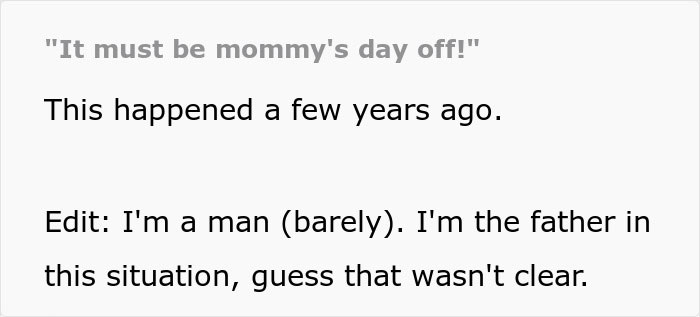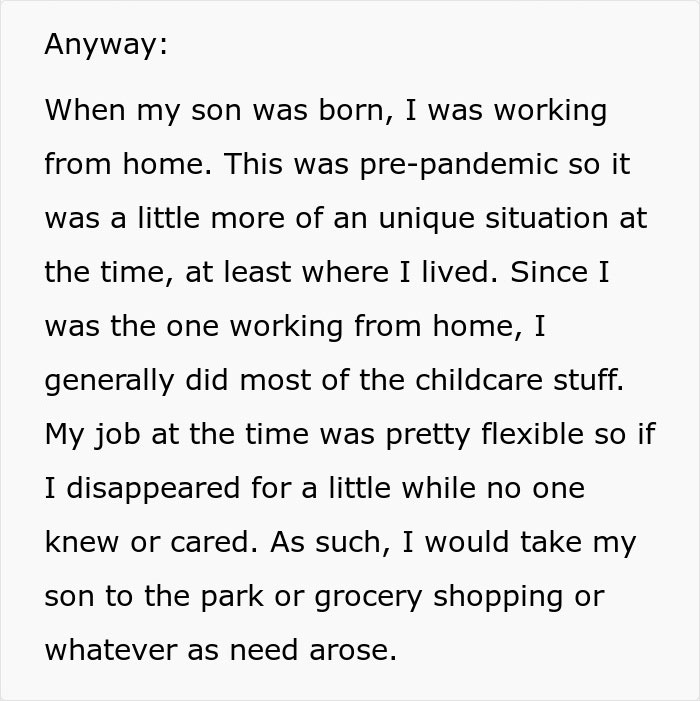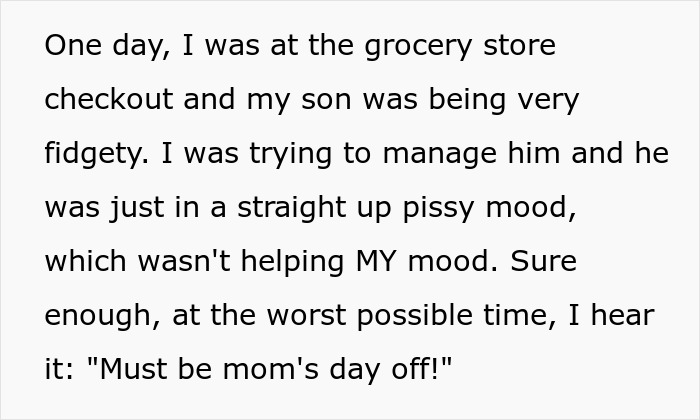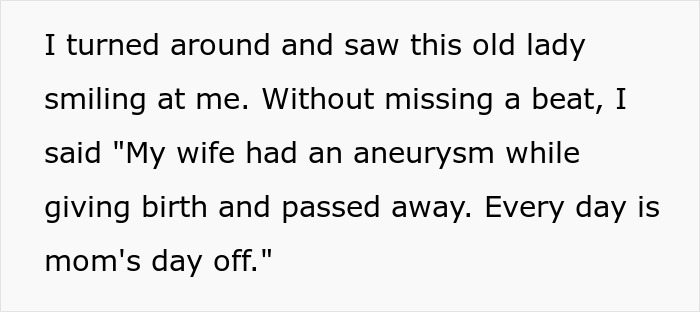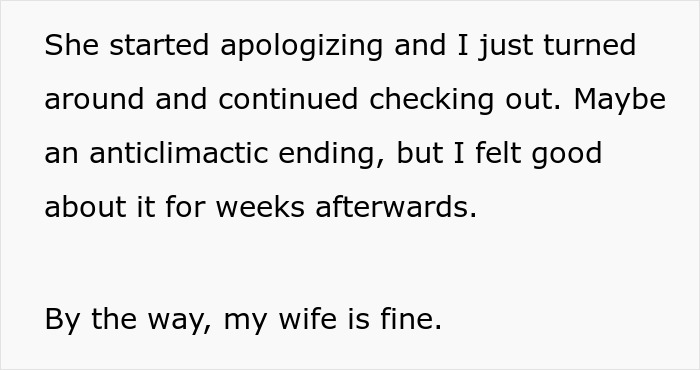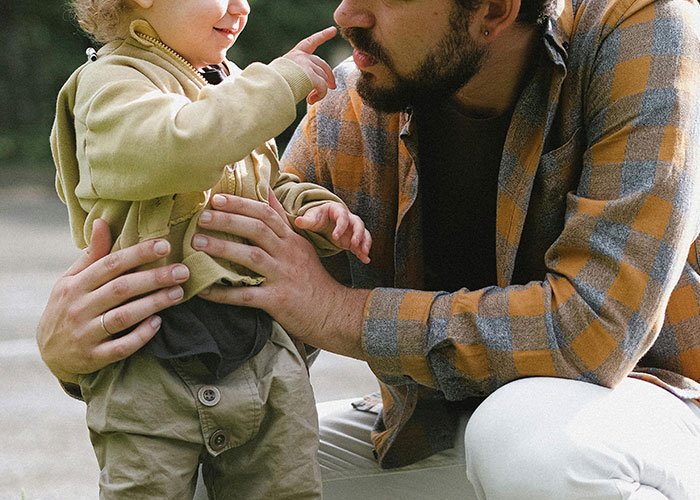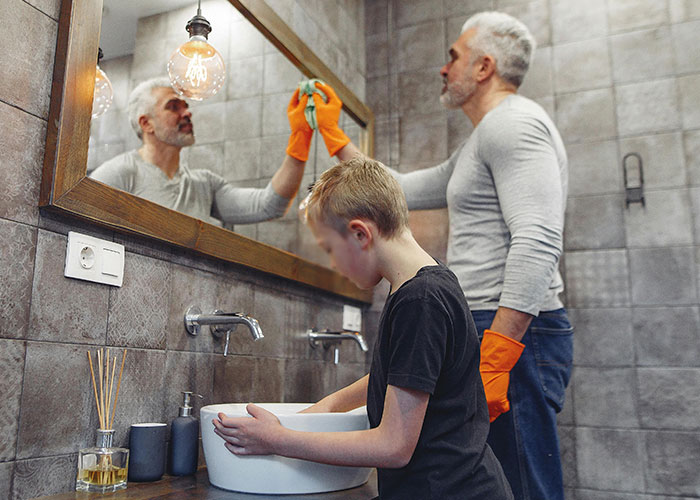“It Must Be Mommy’s Day Off”: Man Lies About His Wife Being Dead In Response To Boomer’s Comment
The role of a modern-day father is no longer limited to solely being the breadwinner or disciplinarian of the family. Now he’s a capable caregiver, shows his softer side, can be single or married, be employed or stay at home, and so much more. However, not all are accustomed to this idea, still enforcing the previous stereotype in society.
Just like this woman, whom the father of the story called “some Boomer.” Every time she would see the dad and son in a grocery store, she would shoot the unfortunate phrase, “Must be mom’s day off!” Getting fed up with the elderly person, the parent clapped back, leaving her speechless.
Scroll down to find the full story and a conversation with licensed clinical professional counselor and marriage and family therapist Krysteena Wilson, who kindly agreed to tell us more about the modern-day father’s role.
Modern-day fathers are getting more and more hands-on with their parenting
However, some traditionalists haven’t yet stomached this, often sharing their unsolicited remarks out loud
Image credits: halfpoint / envatoelements (not the actual photo)
Image credits: ElboDelbo
“There is a significant effort from fathers to be involved in their child’s life and to take on the identity of a father”
Image credits: Anna Shvets / pexels (not the actual photo)
Bored Panda reached out to marriage and family therapist Krysteena Wilson to learn more about the modern father role and how it has changed. “There is a significant effort from fathers to be involved in their child’s life and to take on the identity of a father,” she told us.
During her professional career, she has seen many more stay-at-home dads and working moms now than in the past. “Modern fathers are focusing on creating an equitable household as well as supporting the mother in bonding and connecting with the child, particularly with new babies (through breastfeeding, cosleeping/bedsharing),” she explains. “Modern fathers are aware of the mental load that mothers have traditionally carried and are trying to offset that as well.”
The data supports the fact that more and more dads want to be more involved with their children, as 82% of full-time, working dads say they’d like to do more childcare. But moving forward and being better is not always easy, as traditionalist views seem to hold them back or at the very least dampen their spirits.
Comments like “It must be mommy’s day off!” show that we as a society have a long way to go to break out of the traditional mother and father roles in the household, says Wilson. “It undermines the father’s ability to be a nurturing and attentive father to their child. Similar comments can also emasculate a father, comparing good parenthood to feminine traits as opposed to both feminine and masculine traits or removing gender stereotypes altogether.”
She adds that “all people are capable of nurturing, not just women, and to disregard that is taking away a father’s desire to step into that role and equate it with what it means to be a good man.”
“Similar to how mothers often receive unsolicited advice on mothering, there is no great answer to these remarks”
Image credits: Gustavo Fring / pexels (not the actual photo)
“Similar to how mothers often receive unsolicited advice on mothering, there is no great answer to these remarks,” explains Wilson. “I’m a fan of educating people through role modeling healthy behaviors and ignoring comments that aren’t empowering the parent in their identified role. People who make remarks like this have their own work to do around gender stereotypes and relationship equality and are likely not going to learn much from a momentary rebuttal.”
The bigger problem that she sees with such remarks is that they prevent small boys from forming multiple identities as men from a young age. “I am a mother to a boy toddler and am quite aware of this myself,” Wilson shares.
“In our home, we focus on cleaning, cooking, organizing, scheduling our day, playing with both dolls and trucks, nurturing small animals, playing sports, and a range of activities that are historically related to BOTH male/female stereotypes, but without placing any emphasis on these tasks AS being related to boy-toys/girl-toys or boy-tasks/girl-tasks.”
Because of traditionalist views that are unsolicitedly shared out loud, many men transitioning into adulthood struggle as they feel like they don’t fit in the breadwinning corporate CEO role. At the same time, they might be hesitant to take on another identity, such as becoming a father or engaging in female-dominant professions.
Therefore, Wilson says, “We need to, as a society, remove gender stereotypes from more than just the household. We need to do this on a larger scale to encourage both men and women to inhabit multiple identities as parent, partner, friend, colleague, business owner, stay-at-home parent, and the like.”
She added, “I also want to note that the comments I make here are from the viewpoint of a binary way of looking at gender and parenting, however, removing stereotypical gender roles can also benefit non-binary identifying persons or gender-fluid identifying persons.”

